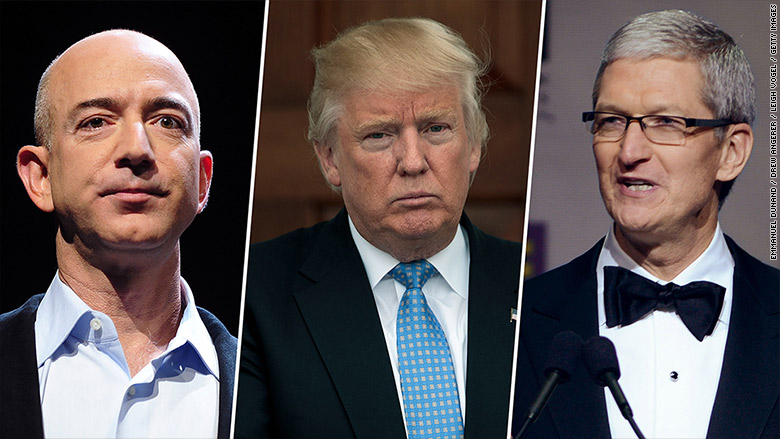
The disruptors want to avoid being disrupted.
On Wednesday, top execs from Apple (AAPL), Google (GOOGL), Amazon (AMZN), Facebook (FB) and half a dozen other large tech companies will meet with Donald Trump. The focus for the meeting is said to be jobs, but that may just be the tip of the iceberg.
Two sources who work closely with tech companies on government policy expect execs at the meeting to focus on trade, corporate tax reform and immigration, among other issues.
"The CEOs are going to be looking to be productive and not overtly adversarial," says one source. "It's about finding areas of alignment and building bridges with the incoming administration."
During the campaign, Trump threatened to boycott Apple, went after Amazon for antitrust violations and called out Facebook's founder for his immigration policies. Now the tech industry -- and Wall Street investors -- are trying to understand the true impact of a Trump administration.
Related: Elon Musk and Jeff Bezos among tech execs to meet with Trump
As Tusk Holdings, a firm that advises tech companies on regulatory issues, put it in a memo to clients hours after Trump won the election: "There is going to be a lot of uncertainty."
Wednesday's tech summit will be the best chance yet to begin addressing that uncertainty. Here are some of the big issues that may be on the table.
Made in the U.S.A.
On the campaign trail, Trump called for Apple to "build their damn computers and things in this country" instead of outsourcing to manufacturing facilities in China and Brazil.
After winning the election, Trump spoke with Apple CEO Tim Cook and told him, "It's my ambition to get Apple to build a great plant, your biggest and your best," in the United States.
Apple may bear the brunt of the criticism for a lack of domestic manufacturing, but Microsoft, Amazon and others have also relied on Asian manufacturers for their hardware products.
"The big public tech companies will come under a lot of pressure from Trump because he will focus on manufacturing," says Bradley Tusk, founder and CEO of Tusk Holdings, who has worked with Uber and Tesla.
Just as Carrier offered Trump a symbolic victory by agreeing to keep a portion of jobs in the U.S., tech companies could offer to invest more in manufacturing at home. The question is how much.
"It's no secret that it's cheaper to build product overseas," says James Cakmak, an analyst with Monness Crespi Hardt. Any significant change that limits the industry's ability to do so could hurt profit margins and valuations, he says.

Automation
Overseas manufacturing is only one part of the job creation issue. The other, near and dear to Silicon Valley's heart, is automation.
Self-driving vehicles, automated kiosks, advanced robotics and artificial intelligence have the potential to eliminate millions of jobs across the country.
Just this month, Amazon was labeled a "job killer" by conservative media after unveiling a bricks-and-mortar grocery store with no checkout lines -- and therefore no cashiers.
Tusk thinks Trump may face "two very competing impulses." He has pledged to do away with excess regulations to boost business -- which would likely encourage automation. "On the other hand," Tusk says, "you gotta imagine he won the truck driver vote 80-20."
Related: Tech workers pledge to never help Trump build Muslim registry
Tech companies may push to work with the government on ways to adapt to the rise in automation.
"Why don't we start to think of a decade-long plan to retrain parts of the workforce that are going to be impacted by this innovation," says Aaron Levie, CEO and cofounder of Box (BOX). "You need to find a way to channel talent from one area to another through long-range planning."
Immigration
After winning the election, Trump said he will focus on immigrant visa programs, but he hasn't talked much about the skilled foreign workers who are a key part of Silicon Valley.
The tech leaders may want to emphasize their need for skilled immigrants for positions that are "very difficult to fill," according to one source who works with the companies in attendance.
More broadly, the tech execs may seek assurances that the rights of all their workers -- immigrants, Muslims and members of the LGBT community -- are protected.
"That's been a cause of anxiety among many in Silicon Valley since the election result," says Levie. "Being able to get out in front of that and make sure there is crisper communication would be very, very helpful."
Net neutrality
It may not be the top concern among the tech CEOs meeting Trump, but undermining net neutrality could be the most "immediate" regulatory issue, according to Cakmak.
Trump has named several advisers who oppose net neutrality to a "landing team" tasked with managing the transition process at the Federal Communications Commission.
Supporters of net neutrality, which prevents Internet providers from prioritizing some online content over others, are already bracing for a fight next year under Trump.
Tax reform
While the tech industry has many reasons to worry about a Trump administration, his corporate tax reform may be one cause for celebration.
Trump has called for lowering the business tax rate from 35% to 15%. He also wants to make it easier for companies to bring back cash held overseas with a repatriation tax holiday.
That would be a huge boon to businesses like Apple, which has more than $200 billion parked overseas. Katy Huberty, an analyst with Morgan Stanley, estimates Apple would save $54 billion in taxes by bringing the cash back under Trump's plan.
"This would give Apple a significant amount of accessible dry powder to potentially make a sizable acquisition, boost returns to shareholders, pay down debt or do all of the above," Huberty wrote in an investor note last month.

